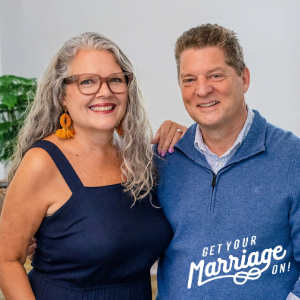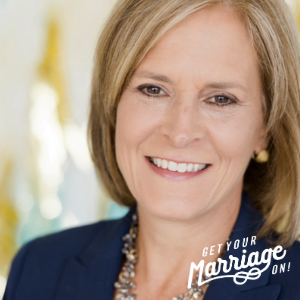Today I want to address some thoughts around what to do if your spouse isn’t enthusiastic about the same things you are. Specifically, what to do if your spouse isn’t on board with your desires sexually. You might wish she or he were more invested in developing her or his sexuality, such as by listening to this podcast ;). Or maybe you wish they would get over their hangups or anxiety about certain sexual behaviors or acts you would like to enjoy together. You might feel disappointed, rejected, and sometimes wonder if this is all there is going to be in your sex life.
Whether it’s a desire to incorporate toys, new positions, oral sex, or just increased frequency, pretty much every couple at one time or another experiences a desire gap in their marriage.
I’ve been pondering this question about what to do when your spouse doesn’t feel on board with you for quite some time and I have five thoughts about this that I want to share. There is much more that can be discussed here, as every person’s situation is complex, but I hope some of these ideas can help!
1. Watch Out For Doubt.
Doubt shows up in many ways: either/or thinking in absolutes such a s“Never” and “Always”. Doubt often leaves you feeling empty and dissatisfied.
Doubt is the enemy of progress. If you doubt a plant will grow, you’ll stop watering it. If you doubt your marriage will grow, you’ll stop nurturing it and investing in it.
Feelings of doubt may feel very real at times. I recall a time in my own marriage I let doubt take a hold of me. It sabotaged our sexual encounters and the otherwise good experiences we were having. Doubt is pernicious because your brain starts looking for other evidence to confirm you negative bias about your situation, and can spread like a cancer in all areas of your relationship.
We live far below our privileges and don’t enjoy all the happiness we could because we doubt.
Recall the story of Moses and the brass serpent. The Israelites were bitten by flying fiery serpents and were dying. The Lord instructed Moses to create a brass serpent and put it on a pole. All the afflicted Isrealite had to do was to look and they were instantly healed! Yet many died because they doubted. Doubt in our marriage keeps us from seeking healing and progress.
Jesus teaches often, “Doubt not. Fear not.”
The antidote to doubt is faith. Simply put, faith is believing in things that are true that you can’t see right away.
Faith takes courage and investment. It’s a choice to look for the good in your spouse and to hold on to the good that you have. If doubt is the enemy of progress, faith is progress’ best friend. Faith is different from blind belief. Faith is rooted in goodness and truth, and always propels you to forward action.
If you struggle to muster the faith you need, start with desire, and let that desire work within you until you have more faith. Like planting a seed, you may not always be able to control the when and how, but you can create the best environment for growth.
2. Recognize that circumstances don’t make us happy or unhappy, but our thoughts do.
We often make the mistake that our circumstances are responsible for the way we feel, but if that were true, why are there unhappy millionaires and happy yet impoverished people? It’s because happiness is not found in our circumstances.
I have a story to share about this, and I’m not proud of it – it wasn’t my best moment. My wife Emily and I had some conflict about attending an event. I really wanted her to attend with me, and was on board at first, but for personal reasons she wasn’t going to attend anymore. This event mattered a lot to me, and something I invested a lot of planning and expense into, and one that if we attended together, would not only be fun but would be good for our marriage. Learning she wasn’t going to attend really put me out.
I was unhappy, and resorted to the old tricks of control and manipulation which married couples are oh soooo good at to try to change her mind. I’m pretty good at putting on a guilt trip and articulating reason and logic make her feel dumb. If anything, it made things worse. Of course none of this worked, and I was depressed for a long time.
And guess whose fault I thought it was that I was depressed? Hers. I blamed my unhappiness entirely on her.
She had very legitimate reasons that affected her willingness and availability to attend. Those circumstances and facts didn’t change, but the way I reacted to those laid my problems.
Things changed two weeks prior to the event after talking to a close friend. She told me a similar story in her marriage where she and her husband were at opposite ends of the spectrum when it came to a particular matter that affected both of them. She told me that rather than resenting her husband for taking the opposing view, she instead decided to be grateful that her husband was living in integrity to his beliefs. Her wanting her husband to live in integrity mattered more to her than him caving to her point of view.
I applied that thinking to my situation and the burden of the whole situation immediately shifted. It’s as if we were in a tug of war, and I dropped the rope. There was peace, compassion, and acceptance in our marriage again.
Note that my circumstances didn’t change, but the way I thought about my circumstances changed… and that’s what made all the difference.
You see, when you think your spouse is the one responsible to make you happy, you shift the locus of control away from yourself, which will always leave you disappointed. The reality is that the only person you have control over is yourself. When you instead put the focus of control squarely on yourself, you can now be in charge of your own happiness. By the way, this is how freedom and happiness, and also our sexuality, is connected.
If you’re stuck in a pattern of thinking your circumstances are making you unhappy, Ask yourself a few questions.
- Separate facts from your thoughts about the facts. Ask yourself, What’s really going on here, and how am I putting meaning to what’s going on?
- Ask yourself: is this thought serving me? By continuing to think these thoughts, what will be the end result?
- Bring awareness to your thoughts and thinning patterns. Awareness is how you change. Next time you have those thoughts that aren’t helpful, throw them out.
There is a happy ending to this story. By a small miracle her circumstances did change and Emily was able to attend the event, and we had such a good time… it turned out better than I thought it would.
3. Have The Courage To Address What Is
We often go a long time, even decades, pretending problems don’t exist or downplay how they’re affecting our marriage. Because we don’t address it, these issues slowly eat away at the foundation of our relationship.
My friends’ husband was recently diagnosed with adult ADHD. For years they struggled. He is very bright, creative, and talented, but the only way he could get things done was if there was enough of a crisis to force his brain to focus long enough on the task at hand, as that’s how he’s learned to compensate for his disability. So their marriage seemed like it was one crisis to another. She felt like she had to walk on eggshells around him. She would overfunction and overcompensate for their struggles, taking on more than her share of the family’s burden.
Since the diagnosis, he’s been on medication that helps his brain function much much better. This change has made a profound impact on their relationship for good – and they’re now capable of enjoying a deeper, much more intimate and healthy relationship. She says the change is night and day.
And in the same breath, she’s upset at herself for letting this problem go on for years and years. She had an idea that something wasn’t quite right but didn’t have the courage to address it.
It takes courage and honesty to be willing to look at what is, things as they really are, and bring it to the light so that we can examine it. Sometimes we’re too scared by what we might discover and keep things buried underground for far too long. If there are serious issues with anxiety or discomfort around sexuality that are impairing passion in your relationship, consider why you haven’t brought things to light. Why is it easier to not address matters? What are you afraid of? What are those thoughts you have, and do they serve you? It’s up to you to judge what to do in this case, but sometimes faith and courage is what’s lacking.
4. Warning: Resenting Your Spouse Is The Easy Way Out
If there’s three things I know about my brain, it likes to avoid pain, gravitates towards pleasure, and hates effort. It also likes to watch out for my safety and keep me alive.
There’s definitely good biological reasons our brains are that way. Brains like to be efficient and not spend any more energy than they have to.
Our brains tend to think it’s easier to resent your spouse for the kind of sex you’re not getting rather than address what needs to be addressed.
Resenting your spouse takes little effort on your part. Resenting them for not doing you sexual favors is a lot easier than putting in effort to become attractive or desirable yourself or how you’re contributing to the problem.
The problem with resentment is that you justify your actions or inactions, your withholding of love, and pettiness because of what your spouse is or isn’t doing. You’re using their limitations to justify why you don’t have to work on your own limitations.
As a result, marriages get relegated to reciprocal unkindness.
However, once one spouse decides to stop resenting the other and puts effort and energy into addressing their own limitations, it has a powerful effect on the relationship. Although there are no guarantees that the other will change, it is the best way to influence your spouse to change for the better because you’ve become better yourself.
A few weeks ago, Emily attended a three night women’s retreat. She had so much fun. I was so proud of her – as part of the retreat she stared down some of her own fears and courageously completed a few things that I knew were hard for her to do. She grew a foot that weekend. When she came home and I saw that she’s a bit different, it put me on the defensive .. in a good way. I realized I needed to step up my game and address some of my own fears and limitations if I’m going to stay caught with her.
The reality is that good, healthy marriages are going to have disappointment at times because love relationships always include risk. There’s a risk that your spouse will change and no longer be the person you thought you married years ago. There’s a risk that the ups and downs and challenges of life will impact your lifestyle and your relationship.
Some people hate that choosing to love someone well includes risk, so they stop choosing. They live in a “one foot in, one foot out” marriage. It’s sad that they don’t fully choose to love and be loved by their spouse.
5. The Goal Is To Learn To Love
I believe marriage and families are God’s people-growing machine. The natural friction that comes with deep, intimate relationships is there to help you learn how to love well, be more compassionate, be more forgiving, and kind.
We desperately need love in order to thrive, and yet, because love is not easy to come by, we struggle to offer it–especially when we don’t feel loved ourselves.
Dr. Jennifer Finlayson-Fife recently said this:
Love makes us stronger. Love gives meaning and sustenance to our often challenging lives.
True love rises above self-justification and comfort. This is why genuine love is so precious.
Truly caring for another human being, even when we are disappointed, takes courage. And courageous love makes the world better. It makes us better.
In the Sermon on the Mount, Jesus teaches that we need to return goodness even when it’s hard. When he says to turn the other cheek, I don’t think He’s asking us to just roll over and accept abuse, but rather return goodness for offense given to us. Give our cloak as well as our coat is about choosing to be kind to people that may not deserve our kindness. Jesus teaches that it’s easy to love those that already love us.
But, “For if ye [only] love them which love you, what reward have ye?” (Matthew 5:46).
If we only love when it feels good to do so, we cannot create a better world or better relationships.
Positive feelings usually come with love, but they’re certainly not a precondition of it. The love that is most precious is offered precisely when it’s not easy.
Because to love is to do what makes another strong, to do what allows another to thrive. To love is to do what increases another’s ability to feel confident in themselves, to express their uniqueness–even if that uniqueness or strength doesn’t reinforce us.
Loving well usually makes others need us and revolve around us less.
When you love sincerely, others’ well-being is more important than your ego.
So to love, irrespective of how it reflects on you, is a deep expression of beauty. It is the best in humanity. It is Godly.
It is what Christ taught us we must reach for in ourselves to know peace and to know God.
As it says in 1 John 4:16, “God is love. Whoever lives in love lives in God, and God in them.”
Conclusion
In conclusion, look at how far you’ve come rather than how far you still need to go. Measure the gain, not the gap.
Watch out for doubt, the enemy of growth.
Recognize that the joy you feel in life has little to do with the circumstances of your life but the focus of your life. And when that locus of control is on yourself, you can choose to be happy.
Have the courage to address what needs to be addressed.
Resenting your spouse for what you’re not getting is easy. hole-heartedly choosing your spouse is the courageous choice.
And look how far you’ve come. Look at how much more kind, compassionate, and patient you’ve become.
So today, I invite you to show your spouse how much he or she matters to you, especially when it is hard to love. I love John Harrigan’s quote “People need loving the most when they deserve it the least”
Do something you know will bless their lives. You’ll both be richer and stronger for it!





